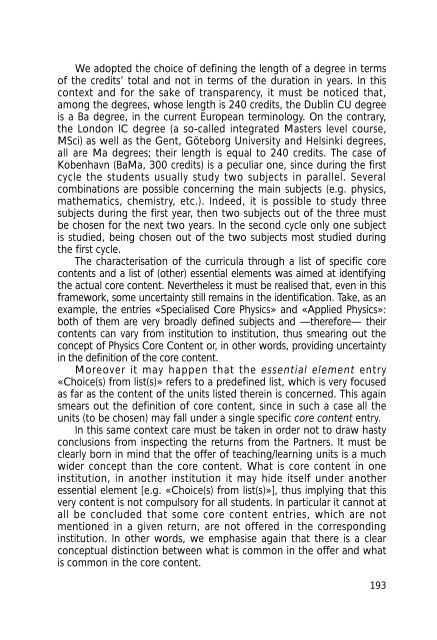Final Report Pilot Project - Relaciones Internacionales de la ...
Final Report Pilot Project - Relaciones Internacionales de la ...
Final Report Pilot Project - Relaciones Internacionales de la ...
You also want an ePaper? Increase the reach of your titles
YUMPU automatically turns print PDFs into web optimized ePapers that Google loves.
We adopted the choice of <strong>de</strong>fining the length of a <strong>de</strong>gree in terms<br />
of the credits’ total and not in terms of the duration in years. In this<br />
context and for the sake of transparency, it must be noticed that,<br />
among the <strong>de</strong>grees, whose length is 240 credits, the Dublin CU <strong>de</strong>gree<br />
is a Ba <strong>de</strong>gree, in the current European terminology. On the contrary,<br />
the London IC <strong>de</strong>gree (a so-called integrated Masters level course,<br />
MSci) as well as the Gent, Göteborg University and Helsinki <strong>de</strong>grees,<br />
all are Ma <strong>de</strong>grees; their length is equal to 240 credits. The case of<br />
Kobenhavn (BaMa, 300 credits) is a peculiar one, since during the first<br />
cycle the stu<strong>de</strong>nts usually study two subjects in parallel. Several<br />
combinations are possible concerning the main subjects (e.g. physics,<br />
mathematics, chemistry, etc.). In<strong>de</strong>ed, it is possible to study three<br />
subjects during the first year, then two subjects out of the three must<br />
be chosen for the next two years. In the second cycle only one subject<br />
is studied, being chosen out of the two subjects most studied during<br />
the first cycle.<br />
The characterisation of the curricu<strong>la</strong> through a list of specific core<br />
contents and a list of (other) essential elements was aimed at i<strong>de</strong>ntifying<br />
the actual core content. Nevertheless it must be realised that, even in this<br />
framework, some uncertainty still remains in the i<strong>de</strong>ntification. Take, as an<br />
example, the entries «Specialised Core Physics» and «Applied Physics»:<br />
both of them are very broadly <strong>de</strong>fined subjects and —therefore— their<br />
contents can vary from institution to institution, thus smearing out the<br />
concept of Physics Core Content or, in other words, providing uncertainty<br />
in the <strong>de</strong>finition of the core content.<br />
Moreover it may happen that the essential element entry<br />
«Choice(s) from list(s)» refers to a pre<strong>de</strong>fined list, which is very focused<br />
as far as the content of the units listed therein is concerned. This again<br />
smears out the <strong>de</strong>finition of core content, since in such a case all the<br />
units (to be chosen) may fall un<strong>de</strong>r a single specific core content entry.<br />
In this same context care must be taken in or<strong>de</strong>r not to draw hasty<br />
conclusions from inspecting the returns from the Partners. It must be<br />
clearly born in mind that the offer of teaching/learning units is a much<br />
wi<strong>de</strong>r concept than the core content. What is core content in one<br />
institution, in another institution it may hi<strong>de</strong> itself un<strong>de</strong>r another<br />
essential element [e.g. «Choice(s) from list(s)»], thus implying that this<br />
very content is not compulsory for all stu<strong>de</strong>nts. In particu<strong>la</strong>r it cannot at<br />
all be conclu<strong>de</strong>d that some core content entries, which are not<br />
mentioned in a given return, are not offered in the corresponding<br />
institution. In other words, we emphasise again that there is a clear<br />
conceptual distinction between what is common in the offer and what<br />
is common in the core content.<br />
193


